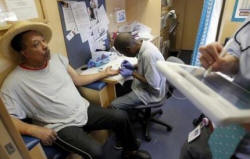|
 Top
U.S. doctors say pricey cholesterol drugs best for
limited group Top
U.S. doctors say pricey cholesterol drugs best for
limited group
 Send a link to a friend
Send a link to a friend
[September 25, 2015]
By Bill Berkrot
BOSTON (Reuters) - Top U.S. heart doctors
said on Thursday that newly developed cholesterol treatments that cost
more than $14,000 per year are best used for the small group of patients
for which they have been approved, at least for now.
|
|
 The drugs are vastly more expensive than the statins that are
currently used by tens of millions of people to help control high
cholesterol and have drawn scrutiny from health insurers who are
concerned they will be widely prescribed. The drugs are vastly more expensive than the statins that are
currently used by tens of millions of people to help control high
cholesterol and have drawn scrutiny from health insurers who are
concerned they will be widely prescribed.
The physicians' views, detailed during a Rethinking Cholesterol
panel presented by Harvard T.H. Chan School of Public Health in
collaboration with Reuters, is not much different than that of some
health insurers.
CVS Health, a pharmacy benefit manager, has set out a program that
aims to limit the drug's use and has said that it would try to use
competition to wring steep discounts out of Amgen Inc and Regeneron
Pharmaceuticals and Sanofi SA, who make the drugs.
It is that competition that Paul Ridker said will help get drug
prices down - an issue that featured prominently in the U.S.
Presidential campaign this week when Hillary Clinton unveiled a plan
to cap drug costs.

"The price tag is exceptionally high. The good news is three
different companies and potentially as many as five may have
products in this arena soon, and hopefully competition will bring us
there," Paul Ridker, a cardiovascular specialist at Brigham and
Women's Hospital in Boston, said during the panel.
"This is the first time we are going to see the payers really exert
their influence here as much as the physicians and the patients and
that's going to be an interesting twist for the story," Ridker said.
[to top of second column] |

How much drugs should cost is a difficult question, the panelists
said. An independent non-profit organization that evaluates clinical
and cost effectiveness of new medicines said earlier this month that
these same cholesterol drugs were not cost effective if used by the
3.5 million to 15 million Americans who could be eligible for
treatment.
There are several trials underway aimed at determining how much
these new drugs cut the risk of heart attacks and deaths.
Patrick O'Gara, ex-president of the American College of Cardiology,
said that he is concerned that people who think they are statin
intolerant will seek out this drug.
"Release of these medications in an unfiltered way to a large number
of patents with statin intolerance is a very worrisome proposition
at this point and time, looking ahead and thinking about cost,"
O'Gara said.
(Reporting by Bill Berkrot in Boston; additional reporting and
writing by Caroline Humer in New York; Editing by Marguerita Choy)
[© 2015 Thomson Reuters. All rights
reserved.] Copyright 2015 Reuters. All rights reserved. This material may not be published,
broadcast, rewritten or redistributed.
 |